Abstract
The efficacy of cimetidine in the prevention of gastrointestinal haemorrhage in a general intensive care unit was evaluated in 221 patients by a placebo controlled double blind randomised study. Criteria for bleeding were (i) haematemesis or gastric aspirate greater than 50 ml fresh blood, (ii) melaena or fresh blood per rectum with an upper source verified by endoscopy if the gastric aspirate was clear, (iii) a fall in haemoglobin level greater than 2 g/dl in a 24 hour period associated with either 4+ occult blood in stools, or coffee ground gastric drainage of at least 100 ml. The drug and placebo groups were similar for age, sex, duration of study and risk factors. One hundred and fourteen received cimetidine and 107 placebo. Only 8% of the patients bled with no significant difference between the two groups (6/114 cimetidine, 11/107 placebo; p = 0.16). There was no correlation between the frequency of bleeding and either the number of risk factors per patient or the duration of intensive care unit stay. Thirteen patients died in each study group, resulting in overall mortality of 12%. The low incidence of haemorrhage, the lack of statistical benefit from cimetidine and the similar mortality all argue against the routine use of this drug in intensive care unit patients.
Full text
PDF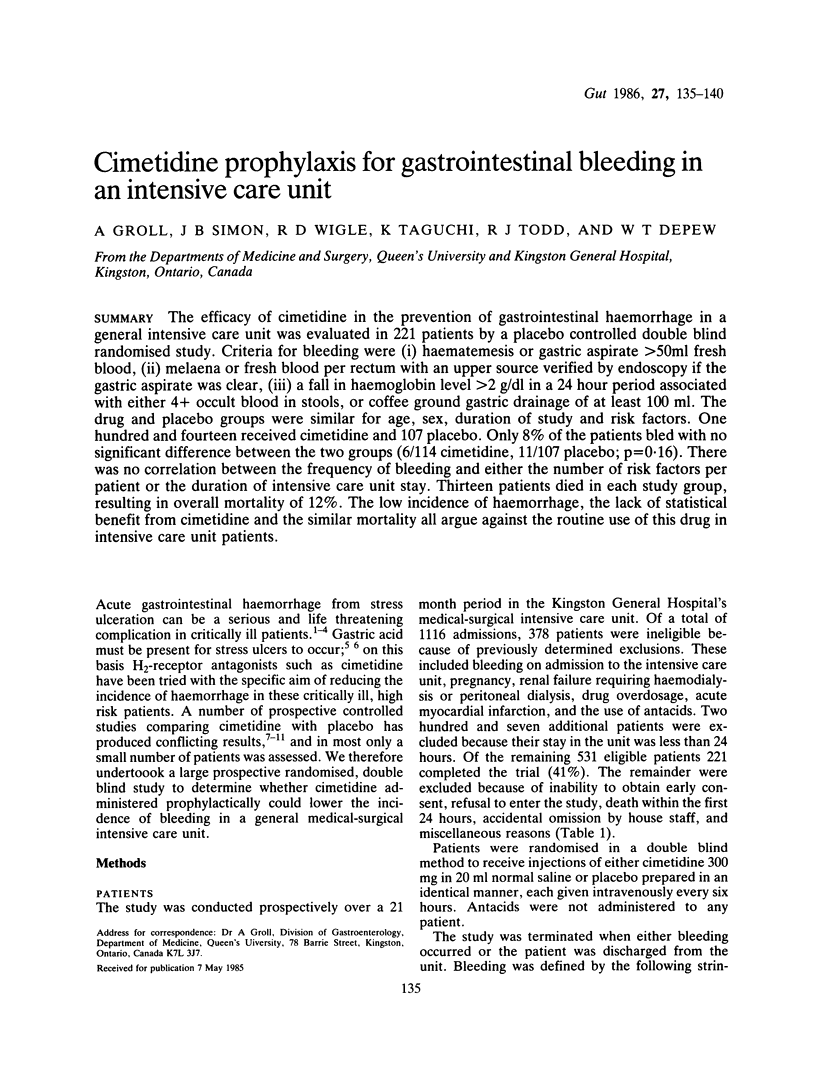
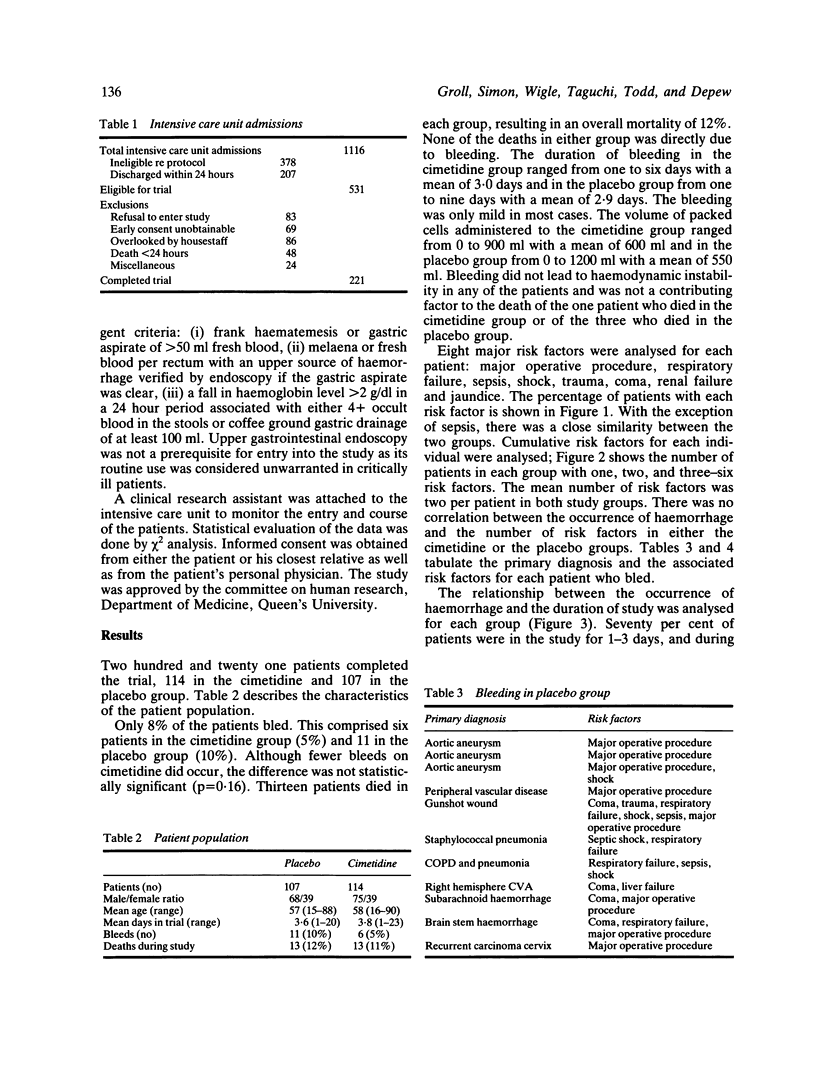
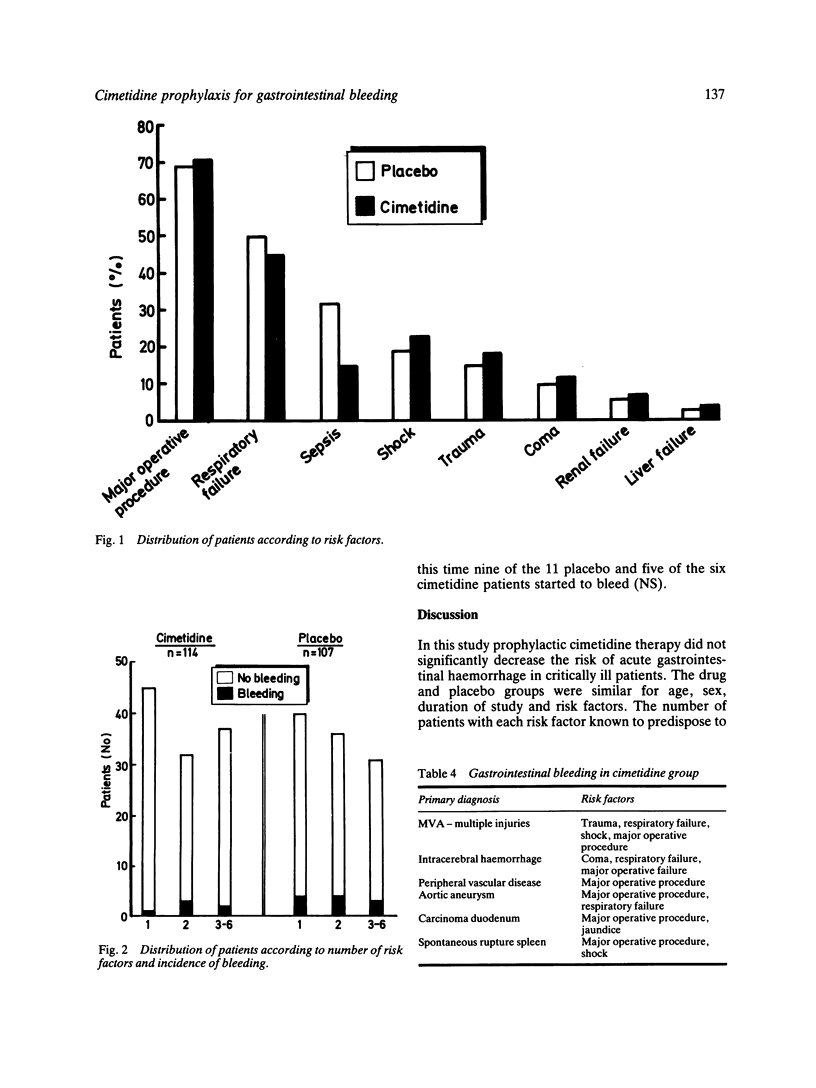
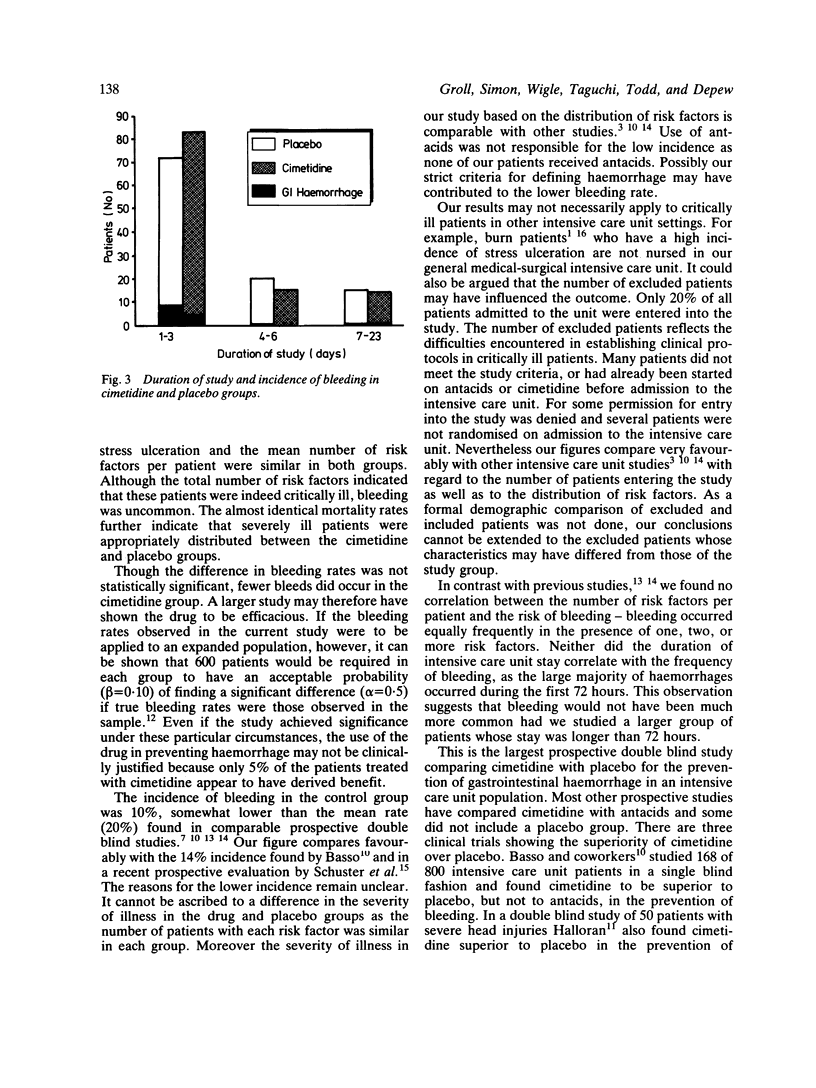
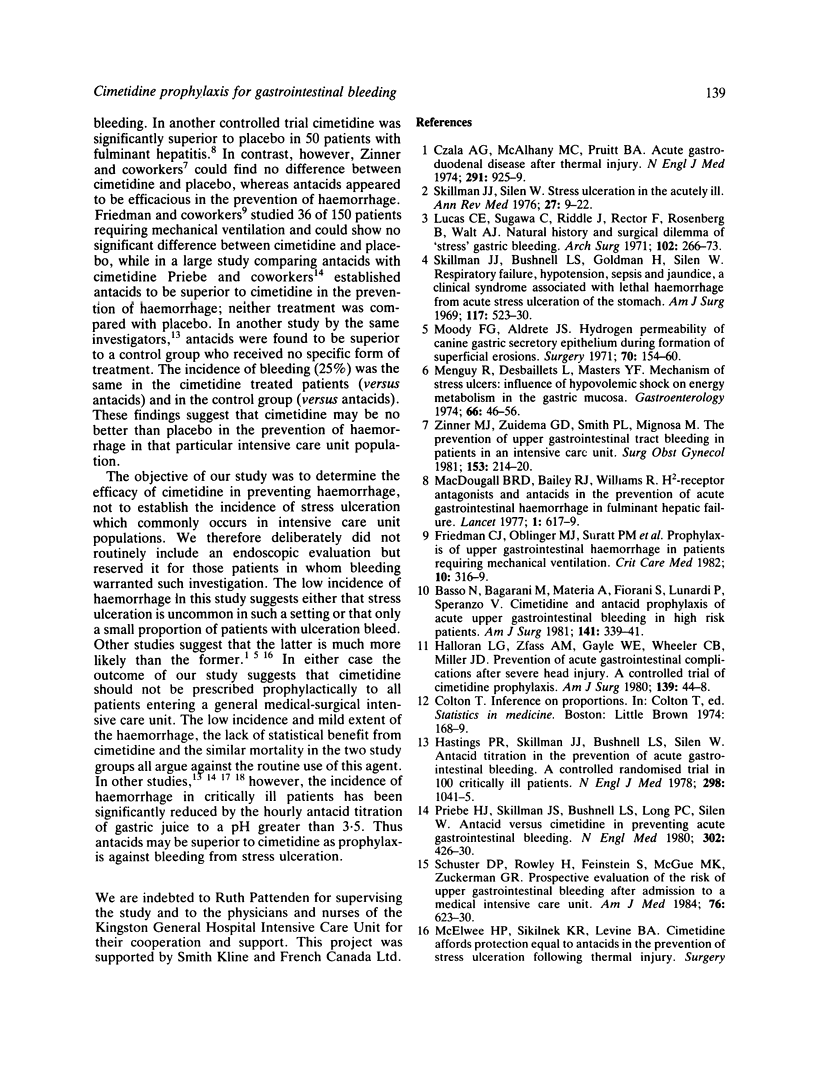
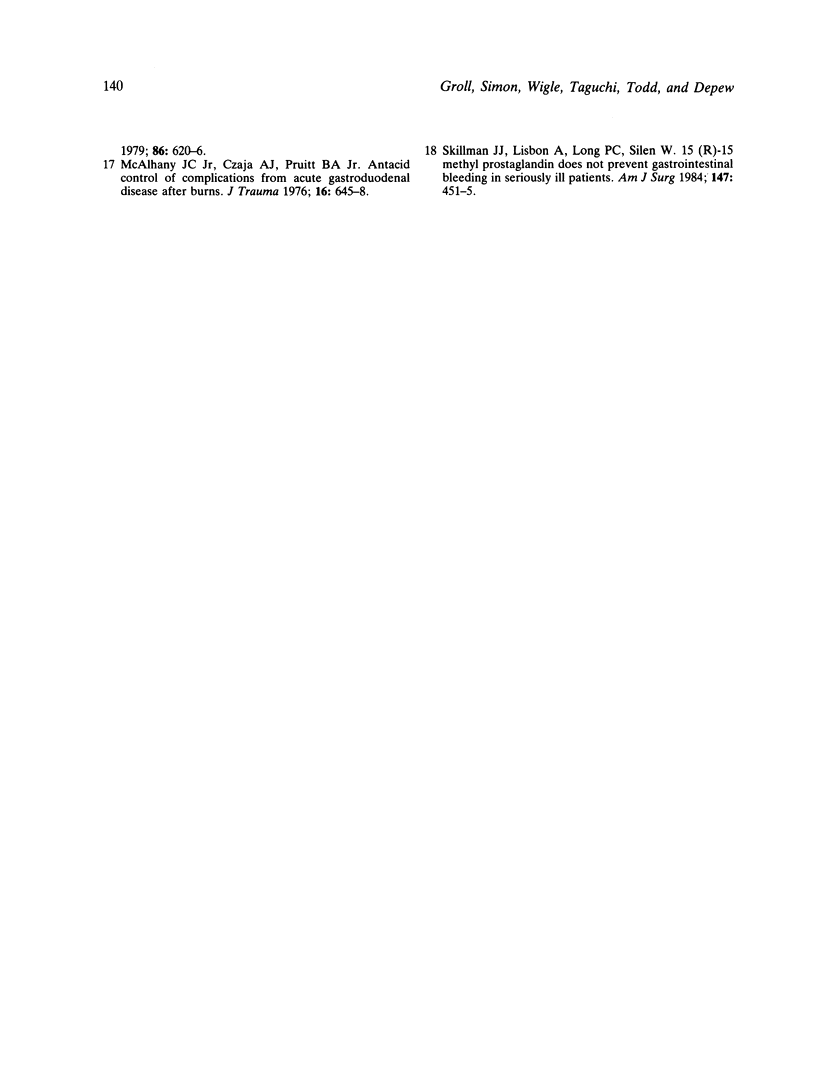
Selected References
These references are in PubMed. This may not be the complete list of references from this article.
- Basso N., Bagarani M., Materia A., Fiorani S., Lunardi P., Speranza V. Cimetidine and antacid prophylaxis of acute upper gastrointestinal bleeding in high risk patients. Controlled, randomized trial. Am J Surg. 1981 Mar;141(3):339–341. doi: 10.1016/0002-9610(81)90191-4. [DOI] [PubMed] [Google Scholar]
- Czaja A. J., McAlhany J. C., Pruitt B. A., Jr Acute gastroduodenal disease after thermal injury. An endoscopic evaluation of incidence and natural history. N Engl J Med. 1974 Oct 31;291(18):925–929. doi: 10.1056/NEJM197410312911801. [DOI] [PubMed] [Google Scholar]
- Friedman C. J., Oblinger M. J., Suratt P. M., Bowers J., Goldberg S. K., Sperling M. H., Blitzer A. H. Prophylaxis of upper gastrointestinal hemorrhage in patients requiring mechanical ventilation. Crit Care Med. 1982 May;10(5):316–319. [PubMed] [Google Scholar]
- Halloran L. G., Zfass A. M., Gayle W. E., Wheeler C. B., Miller J. D. Prevention of acute gastrointestinal complications after severe head injury: a controlled trial of cimetidine prophylaxis. Am J Surg. 1980 Jan;139(1):44–48. doi: 10.1016/0002-9610(80)90228-7. [DOI] [PubMed] [Google Scholar]
- Hastings P. R., Skillman J. J., Bushnell L. S., Silen W. Antacid titration in the prevention of acute gastrointestinal bleeding: a controlled, randomized trial in 100 critically ill patients. N Engl J Med. 1978 May 11;298(19):1041–1045. doi: 10.1056/NEJM197805112981901. [DOI] [PubMed] [Google Scholar]
- Lucas C. E., Sugawa C., Riddle J., Rector F., Rosenberg B., Walt A. J. Natural history and surgical dilemma of "stress" gastric bleeding. Arch Surg. 1971 Apr;102(4):266–273. doi: 10.1001/archsurg.1971.01350040028006. [DOI] [PubMed] [Google Scholar]
- Macdougall B. R., Bailey R. J., Williams R. H2-receptor antagonists and antacids in the prevention of acute gastrointestinal haemorrhage in fulminant hepatic failure. Two controlled trials. Lancet. 1977 Mar 19;1(8012):617–619. doi: 10.1016/s0140-6736(77)92055-4. [DOI] [PubMed] [Google Scholar]
- McAlhany J. C., Jr, Colmic L., Czaja A. J., Pruitt B. A., Jr Antacid control of complications from acute gastroduodenal disease after burns. J Trauma. 1976 Aug;16(08):645–648. doi: 10.1097/00005373-197608000-00009. [DOI] [PubMed] [Google Scholar]
- Menguy R., Desbaillets L., Masters Y. F. Mechanism of stress ulcer: influence of hypovolemic shock on energy metabolism in the gastric mucosa. Gastroenterology. 1974 Jan;66(1):46–55. [PubMed] [Google Scholar]
- Moody F. G., Aldrete J. S. Hydrogen permeability of canine gastric secretory epithelium during formation of acute superficial erosions. Surgery. 1971 Jul;70(1):154–160. [PubMed] [Google Scholar]
- Priebe H. J., Skillman J. J., Bushnell L. S., Long P. C., Silen W. Antacid versus cimetidine in preventing acute gastrointestinal bleeding. A randomized trial in 75 critically ill patients. N Engl J Med. 1980 Feb 21;302(8):426–430. doi: 10.1056/NEJM198002213020802. [DOI] [PubMed] [Google Scholar]
- Schuster D. P., Rowley H., Feinstein S., McGue M. K., Zuckerman G. R. Prospective evaluation of the risk of upper gastrointestinal bleeding after admission to a medical intensive care unit. Am J Med. 1984 Apr;76(4):623–630. doi: 10.1016/0002-9343(84)90286-9. [DOI] [PubMed] [Google Scholar]
- Skillman J. J., Bushnell L. S., Goldman H., Silen W. Respiratory failure, hypotension, sepsis, and jaundice. A clinical syndrome associated with lethal hemorrhage from acute stress ulceration of the stomach. Am J Surg. 1969 Apr;117(4):523–530. doi: 10.1016/0002-9610(69)90011-7. [DOI] [PubMed] [Google Scholar]
- Skillman J. J., Lisbon A., Long P. C., Silen W. 15 (R)-15-methyl prostaglandin E2 does not prevent gastrointestinal bleeding in seriously ill patients. Am J Surg. 1984 Apr;147(4):451–455. doi: 10.1016/0002-9610(84)90004-7. [DOI] [PubMed] [Google Scholar]
- Skillman J. J., Silen W. Stress ulceration in the acutely ill. Annu Rev Med. 1976;27:9–22. doi: 10.1146/annurev.me.27.020176.000301. [DOI] [PubMed] [Google Scholar]
- Zinner M. J., Zuidema G. D., Smith P[L, Mignosa M. The prevention of upper gastrointestinal tract bleeding in patients in an intensive care unit. Surg Gynecol Obstet. 1981 Aug;153(2):214–220. [PubMed] [Google Scholar]


